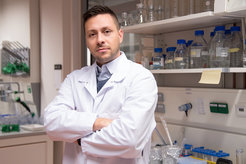European grant for Constantinos Demetriades
How do cells sense nutrient availability?
Dr. Constantinos Demetriades from the Max Planck Institute for Biology of Ageing in Cologne has been awarded with the prestigious Starting Grant from the European Research Council (ERC). The award aims to support most talented scientists in Europe to give them the freedom to pursue their ideas. With his research Dr. Demetriades wants to reveal how cells sense nutrient sufficiency or scarcity and how dysregulation of nutrient sensing mechanisms contributes to pathological conditions.

Many animals hibernate during winter. By lowering their metabolic needs to a minimum level, they can survive a period when food would be scarce and insufficient. If such an animal would stay active during winter it would probably not survive, as the limited available amounts of food would not be able to cover its nutritional needs. Therefore, sensing food availability in the environment is of crucial importance for every organism.
This is what our cells also do. Each cell that composes the human body takes up nutrients from its environment and utilizes them as an energy source or as structural components. Consequently, cells possess elegant molecular mechanisms that sense the presence or absence of nutrients and adapt their metabolism and growth properties accordingly. Therefore, under physiological conditions, cells only grow when nutrients are sufficient. Importantly, dysregulation of these nutrient sensing mechanisms can result in aberrant cell growth, a common characteristic of cancer cells. In the ERC-funded project, Dr. Demetriades will focus on elucidating the mechanistic aspects of nutrient sensing and growth regulation.
The awardee
Dr. Demetriades obtained his Biology Degree from the Aristotle University of Thessaloniki, and pursued his PhD at the Biomedical Sciences Research Center ‘Alexander Fleming’ in Athens, and the Aristotle University of Thessaloniki, Greece. He then joined the lab of Aurelio Teleman at the German Cancer Research Center (DKFZ) in Heidelberg, Germany as a Postdoctoral Researcher. Since January 2017, Dr. Demetriades is a Max Planck Research Group Leader at the Max Planck Institute for Biology of Ageing in Cologne, Germany.
The European Research Council (ERC)
The European Research Council, set up by the European Union in 2007, is the first European funding organisation for excellent frontier research. Every year, it selects and funds the very best, creative researchers of any nationality and age, to run projects based in Europe. ERC Starting Grants are awarded to researchers with two to seven years of experience since completion of the PhD (or equivalent degree) and a scientific track record showing great promise. The research must be conducted in a public or private research organisation located in one of the EU Member States or Associated Countries. The funding (up to €1.5 million per grant) is provided over up to five years.












